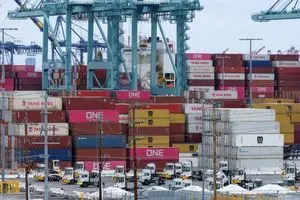Bedouin families left homeless as Israel demolishes Negev village
Bedouin families left homeless as Israel demolishes Negev village

A large contingent of Israeli police forces on Wednesday raided the unrecognised Palestinian Bedouin village of al-Sir in the Negev (Naqab) desert and destroyed al-Omrani neighbourhood, including 40 homes and other structures.
Plumes of dark smoke rose over the village as residents, who had tried until the last moment to reach a compromise with the authorities, set fire to most of the homes using tyres.
Hundreds of police officers - some riding dirt bikes, all-terrain vehicles and horses - stormed the neighbourhood, where residents had been relocated by the authorities in the 1950s from a nearby area.
Al-Sir is the largest village in the country to be subject to demolition orders so far.
Residents were informed by the police the day before that the cost of the demolition, which would be charged to them, was 3 million shekels (nearly $900,000).
Before police forces arrived, Tawfiq al-Omrani, 50, was clearing out the home of his 85-year-old mother, who relies on an oxygen tank.
"I was born here. My whole history is here. It's hard when they destroy everything you’ve known. Soon my mother won’t even have a roof over her head," Omrani told Middle East Eye.
"If only they had given us an alternative place until they sort out the new neighbourhood, but they just tell you to manage on your own."
Even when the new neighbourhood is built, according to the Israeli government’s plan, Omrani said authorities don’t guarantee the people who had been displaced a home.
"They don’t care," he said.
Around 8am, police began pushing back men who had gathered to protest at the entrance to the neighbourhood, knocking some to the ground and throwing stun grenades and gas grenades at the crowd. Several residents were wounded.
On the hill overlooking the neighbourhood, women and children of the village gathered, crying out in protest towards the armed police and bulldozers.
Fadi, a 24-year-old Bedouin, said: "They want the kids here to grow up with racism and hatred. People save money to build a home, and then it gets destroyed."
"My brother paid 160,000 shekels, got married, and now he’ll be on the street," he said.
'Where will we go?'
Nearby, a 61-year-old woman cried over her house that was destroyed before her eyes.
"Where will we sleep, eat and shower? What does [National Security Minister] Itamar Ben Gvir want from us?" said the woman, who asked not to be named.
"He only cares about settlers. We were here before the state, we lived here before the Zionists - this is our village."
The woman said that the people of the village have spent their entire lives working in agriculture to build their homes only for Israeli authorities to destroy them without offering alternative housing.
'We’ll pitch tents and live in them. I’m not afraid of the police. They destroy, we build'
- Maliha, village resident
"We’re old women. How will we live without a roof over our heads and a floor under our feet?"
Throughout the morning, the women huddled under a makeshift shade made from blankets and looked on in anger as the demolition continued.
Maliha, 55, sat watching her house being destroyed: "We’ll pitch tents and live in them. I’m not afraid of the police. They destroy, we build."
So far, about 200 homes have been destroyed in the village, and this week's operation marks the fourth wave of demolitions there.
Several residents have carried out self-demolitions to avoid violence, humiliation, and heavy fines from the Israeli demolition operations. The village of al-Sir includes about 600 families, half living west of Route 40 and half east - the area where homes have been destroyed since May.
'I'm speechless'
More demolitions are expected soon. The Israel Land Authority says some evacuations are to make way for a new neighbourhood in Shaqib al-Salam, or Segev Shalom, which residents do not oppose - so long as they are included in the plans.
Shaqib al-Salam is a Bedouin town and a local council in the Southern District of Israel, southeast of Beersheba.
So far, the state has not provided alternative housing.
According to the Regional Council for Unrecognised Villages in the Negev, since the current government took office, five entire villages and neighbourhoods have been demolished, including Wadi Khalil and Umm al-Hiran.
Based on a combination of state data and council estimates, since early 2023, 11,000 structures have been demolished, including 2,500 homes, leaving an estimated 10,000 people homeless.
After police removed the residents, officers spread out between homes and on the surrounding hills, while bulldozers began the demolitions - a relatively easy task, as most buildings were constructed from aluminum sheets, which took only seconds to collapse.
The bulldozers didn’t spare the decades-old olive trees either.
"I’m speechless," said Ziad al-Omrani, echoing the sentiments of many in the village. "It’s sad and infuriating. We were in talks with the authorities for over two months.
"They ignored us. Their only goal is destruction, not finding solutions for people. Just look at the force they brought here."
He said he didn’t believe the state would come at them with such strength. In the past, families whose homes were destroyed would move in with relatives, but with entire neighbourhoods now being razed, community solidarity is no longer enough.
"We’re law abiding, not criminals. They say we’re ‘invaders’ but… my family has been here for 80 years. We won’t move, we’ll pitch tents. Bedouins adapt."
No guarantees
On Tuesday, a meeting was held between the police and the Bedouin Authority, but the talks ended without any agreements.
Village residents said that they were informed that they had less than two hours to demolish the entire neighbourhood.
One resident, Ziad, said some villagers refused to demolish their homes the day before because no documents or guarantees were provided in writing.
“If they had given us a paper to sign with our lawyers, we would have signed. But to give me two hours to destroy my own house without documents? They’d just use that to say, ‘you did it yourself, and that’s it,’” said Ali.
'We’re law-abiding, not criminals. They say we’re ‘invaders,’ but… My family has been here for 80 years'
- Ziad Omrani, village resident
“We saw what happened to our neighbours who demolished their own homes, they weren’t given any solutions.”
There is no guarantee that all residents whose homes were demolished will be eligible for plots in the new neighbourhood.
The new neighborhood is planned to include 1,700 housing units, mostly plots and a few apartment buildings.
Eligibility is not automatic: the Bedouin Authority must first recognise residents as eligible, then plots are allocated, and finally building permits are issued. But the last step depends on full infrastructure development, which often fails to materialise.
In recently recognised villages, only a small fraction of residents have actually received legal building permits.
'This too is ethnic cleansing'
Around 11am, police and bulldozers began to withdraw from the village. Inspectors put up yellow signs warning that construction on the site is prohibited. When residents approached the demolition area, police rushed back at the youths, threatening and pushing them away - a show of force to remind everyone who was in charge.
Amid the ruins stood an educator from Shaqib al-Salam, who teaches children from the demolished neighbourhood. He handed out water to residents.
"They [the children] didn’t know what they were waking up to, it came as a surprise. They are at an age where they are not aware of everything that’s going on," the teacher said.
"I, as an adult, have never seen images like this. It’s shocking and painful. We have students who now can’t do their homework, have nowhere to put their books, nowhere to shower before school."
In June, thousands protested in Beersheba against the demolitions and launched a grassroots boycott of local businesses to demonstrate the power of Bedouin communities from surrounding unrecognised villages. Some businesses reported losses.
This week, protests and calls for a boycott resumed, with around 1,500 people demonstrating on Thursday in front of the Government Complex.
Huda Abu Obaid, executive director of the Negev Coexistence Forum, which advocates for Bedouin rights in southern Israel, said the protests reflect growing public anger.
She also noted the close family and community ties between Palestinians in Gaza and Bedouins in the Negev.
"We don’t always say it openly, but people are also protesting to express their anger at what’s happening in Gaza," she said.
"They can’t always say it clearly, but this too is displacement, expulsion and ethnic cleansing."
This article was originally published in Hebrew in Sikha Mekomit.









